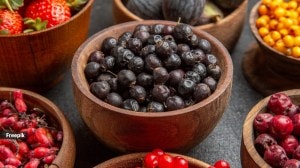Shilpa Shetty tells Kareena Kapoor she has carbs and breads: Why are they still diet essentials?
A zero carb meal can cause nutritional deficiencies, says dietician
 Actor and fitness enthusiast Shilpa Shetty. (Instagram/ shilpa shetty)
Actor and fitness enthusiast Shilpa Shetty. (Instagram/ shilpa shetty)When actor and fitness enthusiast Shilpa Shetty admitted to having carbohydrates through the day in a talk show with actor-colleague Kareena Kapoor Khan — she loves her French toast —- she revived the debate on whether carbohydrates are good for us and can they be part of a healthy balanced diet.
What was significant was Shilpa’s admission of switching over to a low-carb diet to shed her post-pregnancy weight and swinging back to having a balanced meal once that goal was achieved. Two, by choosing French toast, she had made sure that bread was combined with protein – eggs – a breakfast option that delays digestion, keeps hunger pangs at bay and prevents post-meal sugar spikes.
“Many people believe a zero carb meal will miraculously get them back in shape but it may cause nutrient deficiencies. That’s why you need low-calorie carbs,” says Mukta Vasishta, dietician at Sir Ganga Ram Hospital, New Delhi. Here’s her advisory:
Why are carbs necessary?
Carbohydrates form a major slice of the macronutrient pie. They fuel up the body, boost immunity, cognitive function and gut health. About 55 per cent of the body’s calorie requirement should come from carbohydrates, 30-35 per cent from protein and 10 to 15 per cent from good fats. Since Indians are prone to diabetes, they should get 50 per cent of their calories from carbohydrates, 35 per cent from protein and 15 per cent from fats.
Watch the type and amount of carbohydrates
Replace simple/refined carbs with fibre-rich complex carbs and trans-or saturated fats with good fats. Practise portion control. Complex carbs lend satiety, ease your digestion and delay breakdown of glucose in the body. Non-starchy carbs contain fibres, minerals like magnesium, B vitamins and antioxidants. Include low glycaemic index (a measure of how fast foods break down to glucose) foods. Have oats, multi grain flour, millets, pulses, wholegrains, legumes, green leafy vegetables and fruits.
The key to fruit consumption in diabetes is incorporating them into the daily carbohydrate allowance, which means cutting back on other carbs. One serving of fruit should contain 15 grams of carbohydrates and the total daily intake should not exceed 30 gm. Eating fruits as a snack consumed mid-morning or mid-evening is preferable to having them as dessert after meals since they add to the calorie load. Rather than consuming large portion sizes of fruits, it is best to combine them with protein-rich foods like dairy products or nuts. Choose low sugar fruits like apple, pear, guava, berries, papayas and melons.
Smart food combinations
Combine carbs with lean protein and good fats to slow down their digestion and absorption into the blood, thereby regulating blood sugar. Some of these combinations would be whole wheat cereals with milk, rice and lentils, millets and lentils with peanuts and cottage cheese, oats and chickpeas, foxnut kheer, soya chunk cutlets with rice and so on. These provide good quality amino acids, fibre and micronutrients such as zinc, iron and calcium.
Limit or avoid drinks with added sugars, packaged fruit juices and empty calorie foods (these do not have other nutrients and can still keep you hungry). Avoid packaged snacks.



- 01
- 02
- 03
- 04
- 05




























